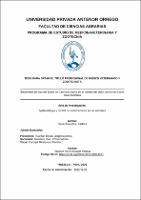Efectividad del uso del aceite de Cannabis sativa en el manejo del dolor crónico en Canis lupus familiaris

View/
Download
(application/pdf: 1.169Mb)
(application/pdf: 1.169Mb)
Date
2023Author(s)
Cieza Saavedra, Yadhira
Metadata
Show full item recordAbstract
En el presente trabajo de investigación, el objetivo es determinar la efectividad del
uso del aceite de Cannabis Sativa en el manejo del dolor crónico en canino. Se
evaluaron a 16 animales, bajo los criterios de inclusión: diagnóstico comprobado de
dolor crónico sin tratamiento reciente, peso entre 10 a 20 kilos, edad entre 5 a 10
años, y tanto hembra como machos. Los animales fueron divididos en dos grupos
de estudio T0 (tratamiento exclusivo con analgésicos antinflamatorios no
esteroides- AINES) y T1 (tratamiento exclusivo con aceite de Cannabis Sativa); los
animales del T1 recibieron vía oral una dosis inicial de 0,5mg/5kg la que fue
aumentada de forma gradual y los animales de T0 recibieron AINES. Se aplicó la
escala de Glasgow modificada para la evaluación del grado del dolor y se
obtuvieron muestras sanguíneas para la evaluación de hemoglobina (Hb), alanina
aminotransferasa (ALT), fosfatasa alcalina (FA), urea y creatinina. Los datos
obtenidos fueron procesados estadísticamente mediante la prueba U de Mann Whitney para la evaluación con la escala de Glasgow modificada observándose una
diferencia significativa (p=0,0016) frente a la reducción del grado del dolor entre
ambos tratamientos. Así mismo, se aplicó la prueba de t-Student para una muestra,
observándose diferencia significativa entre ambos tratamientos en los valores de
Hb (p=0.0212), ALT (p=0,0002), urea (p=0,0037) y creatinina (p<0.0001), respecto
a los valores de FA no se observó diferencia (p=0,2312). Se concluye que el uso
del aceite de Cannabis Sativa es efectivo en el manejo del dolor crónico en caninos,
no evidenciando efectos secundarios en los parámetros sanguíneos y bioquímicos
evaluados en los animales del estudio. In this research work, the objective is to determine the effectiveness of the use of
Cannabis Sativa oil in the management of chronic pain in canines. Sixteen animals
were evaluated, under the inclusion criteria: proven diagnosis of chronic pain without
recent treatment, weight between 10 to 20 kilos, age between 5 to 10 years, and
both female and male. The animals were divided into two study groups T0 (exclusive
treatment with non-steroidal anti-inflammatory analgesics - NSAIDs) and T1
(exclusive treatment with Cannabis Sativa oil); T1 animals received orally an initial
dose of 0.5mg/5kg, which was gradually increased, and T0 animals received
NSAIDs. The modified Glasgow scale was applied to assess the degree of pain,
and blood samples were obtained to assess hemoglobin (Hb), alanine
aminotransferase (ALT), alkaline phosphatase (AP), urea, and creatinine. The data
obtained were statistically processed using the Mann-Whitney U test for the
evaluation with the Glasgow scale modified, observing a significant difference
(p=0.0016) in the reduction of the degree of pain between both treatments. Likewise,
the t-Student test was applied to one sample, observing a significant difference
between both treatments in the values of Hb (p=0.0212), ALT (p=0.0002), urea
(p=0.0037) and creatinine (p<0.0001), with respect to FA values no difference was
observed (p=0.2312). It is concluded that the use of Cannabis Sativa oil is effective
in the management of chronic pain in canines, not showing secondary effects in the
blood and biochemical parameters evaluated in the study animals.
Collections
- Veterinaria y Zootecnia [197]

